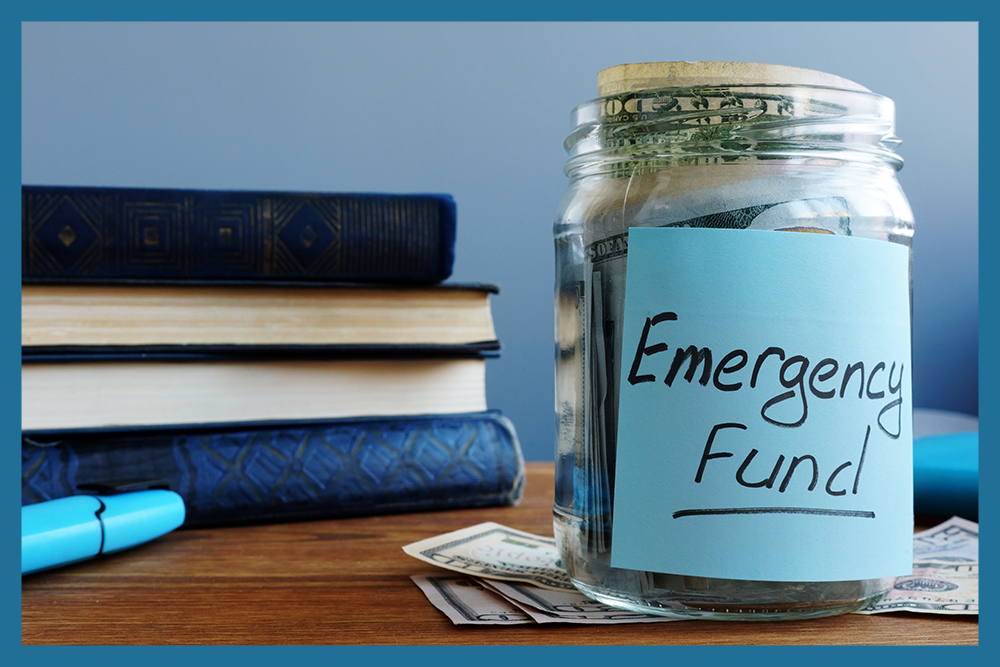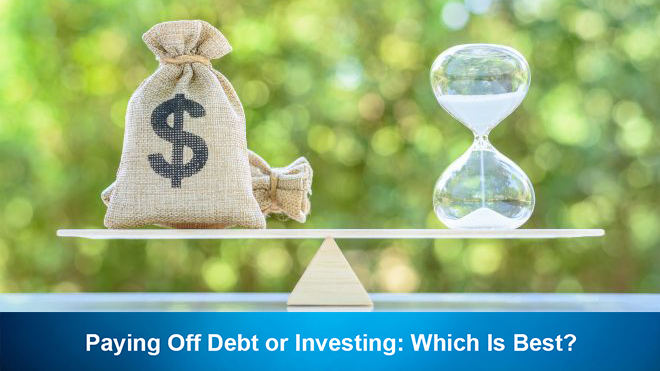Is it more beneficial to invest your money or use it to further pay down debt? Either is a worthy goal and striking the perfect balance looks different for everyone.
Those who find themselves with extra cash have a tough decision to make. Should they use it to pay off outstanding debt, or use it “smartly” and make the money work for you via investing? If you have debt you’re certainly not alone. Nationally, household non-housing debt is at the highest level in 16 years.
Should you strive to reduce your share of that credit card, student loan, and housing debt, or place your money in a retirement savings account or other investments? The answer is, you should do both.


Investing is a way to set money aside for the future, ideally in an investment vehicle, such as stocks, bonds, or mutual funds, that will grow in value over time Debt, on the other hand, represents money you’ve already spent and that a lender is charging you interest on. Left unpaid, that debt will grow and grow, with interest charges adding to your balance and incurring interest charges of their own.
Before embarking on an aggressive savings or investment strategy, you need to make sure your bases are covered should the worst happen.


Before funneling cash into debt or investments, you need to make sure you have an emergency fund in place.
Cash reserves have never been more essential to protecting your finances. Your emergency fund should aim to cover three to six months of expenses—perhaps as much as a year if your job isn’t secure. That money should be kept in a safe, easily accessible account, which will spare you from having to tap retirement funds or run up your credit card balance for unexpected bills.
By setting money aside each month it’s less likely these curveballs will increase your debt. If you have high-interest debt, you may consider a slightly lower number — at least until your most expensive debt is gone.


Credit card debt is the number one reason why people put off investing. This type of debt comes with high interest rates and a small minimum balance that needs to be paid every month, keeping you on a paycheck-to-paycheck lifestyle and unable to save.
In almost every case, paying off the credit card is a better decision than investing and accepting a lower rate of return than feeding the insatiable interest rate on the card.
The same goes for past-due debts; whilst high interest debt can be expensive, but past-due balances can affect your credit and financial well-being for years. If you’re delinquent on any of your debts or you have accounts in collection, work on paying those off before you take any other steps to invest or pay off other debts.
Collection accounts can hurt your credit as long as they remain on your credit report. The faster you can get current, the better.


Before diving into a new debt payoff or investing strategy, review your company’s retirement plan. If your employer offers a 401(k), it may match some or all of your monthly contribution to the retirement account.
Taking advantage of a 401(k) contribution match is important regardless of your debt situation because it essentially provides you with a rate of return of up to 100%. It also reduces your taxable income and, most important, is one of the easiest ways to prepare for retirement.


If you don’t have any high interest debt, investing your extra cash flow can help you create a better life in the future. As a general rule, if you can earn more interest on your money by investing it than your debts are costing you, it makes sense to invest.
The best place to start with investing is your retirement account. Retirement Income experts recommend putting at least 15% of your annual income toward retirement. Beyond retirement, the right investments for you will depend on your risk tolerance. Risk tolerance is a term used to describe your ability to withstand a certain degree of volatility in your investments.
Factors that help determine your risk tolerance include your age, income, lifestyle and when you’ll need the money.


Paying down debt vs. investing doesn’t have to be an either/or decision. A balanced approach to wealth management serves both today’s needs and tomorrow’s goals. For some that may mean paying off some debt today while simultaneously investing for the future.
Your own needs and circumstances will be unique. Evaluate alternatives and find an approach that fits your situation and goals. Finally, work with your financial advisor at CKS Summit Group to create an investment strategy suited to your individual needs.
We believe professionally managed tactical stock market and non-stock market portfolios can provide healthy, long-term upside growth potential. It can also be very effective at preserving principal while allowing for a high degree of downside risk protection.
Asking the right questions enables us to offer retirement income options for you. So, schedule your complimentary strategy session with us here today.



